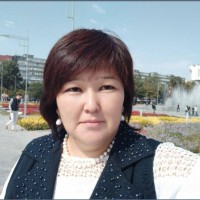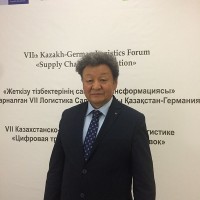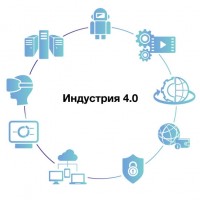Strengthening and intensifying scientific research the public procurement process in the Kyrgyz Republic
Candidate of Economic Sciences, Assoc. Department "Logistics"KSTU named after I. Razzakov
The transition of the Kyrgyz Republic to a system of market relations has radically changed the conditions for the country's development. Ensuring sustainable and balanced development of the state on the basis of an integrated and rational use of all processes in a given territory is becoming a top priority.
Public procurement is a necessary day-to-day process. This process needs constant improvement, as real life puts forward new requirements, new conditions. Therefore, the efficient and rational use of budget funds is a state task. The public procurement system can be understood as a set of rules that determine the essence and forms of relations aimed at meeting state needs, as well as persons participating in these relations [7, 2016; 8, 2016].
Myrzakerim U.B., studying the experience of development of other countries, reveals that the development of the public procurement system always occurs in stages and sometimes takes a long time. For example, the United States was the first to begin to regulate procurement and the first federal law on public procurement was adopted there back in 1792, but the procurement process became effective and rational only at the beginning of the twentieth century [17, 2019]
In the conditions of the Kyrgyz Republic, the need for institutional development and increasing the efficiency of the public procurement system is widely discussed in the works of A.S. Umetaliev. He notes that procuring entities can function effectively only if there is an adequate legal and regulatory framework and institutional infrastructure, and professionalism and honesty of personnel involved in procurement are also required. An important aspect in terms of ensuring professionalism is the inclusion of a separate professional direction related to procurement into the civil service system [20, 2010].
Considering the regulatory framework of the public procurement system in the Kyrgyz Republic, Umetaliev A.S. writes that regulations should be improved to ensure the effective use of budget funds, as well as to reduce corruption schemes [21, 2013].
Sabyrova G.Zh. notes that in the field of public procurement of Kyrgyzstan, about 30 billion soms rotate and annually more than 15% of the gross domestic product is spent on public procurement. Considering the constant deficit of budgetary funds, their efficient and economical use at all times has been and remains a topical issue. Therefore, one of the most important tasks facing the Government of the Kyrgyz Republic is to ensure openness and transparency of public procurement procedures. The government of the Kyrgyz Republic began to carry out a reform in the field of public procurement in 1994, and already in April 1997, the first Law of the Kyrgyz Republic “On public procurement” was adopted. Since then, the legal framework governing procurement has been regularly revised.
According to Sabyrova G.Zh. internal audit is one of the few currently available and at the same time underestimated resources, the correct use of which can improve the efficiency of public procurement. An audit of public procurement is a check, analysis and assessment of information on the legality, feasibility, validity, timeliness, efficiency and effectiveness of procurement expenditures for planned to be concluded, concluded and executed contracts [19, 2014].
Several works by T.Sh. Abdyrov are devoted to detailed scientific research. and Adylbekova A.A. They noted that serious transformations in public procurement started in 2011, when the government began a reform in this area by introducing an electronic system. The reform resulted in the introduction of a unified system of electronic public procurement. The work on its creation was carried out by the state institution "Info-System"; in 2012, an information portal for public procurement of the Kyrgyz Republic was also created. By the end of May 2013, the number of portal users reached 1,843 purchasing organizations and suppliers. At the same time, the total number of participants in public procurement amounted to more than 2,000 budget organizations and 3,000 suppliers. According to the initial forecast, the number of potential participants should be from 5 to 7 thousand organizations.
However, despite the reforms in the field of public procurement, there are also shortcomings. The regulatory and legal framework needs to be improved, it has not yet been possible to completely switch to electronic communication between suppliers and procuring organizations, it is necessary to improve the public procurement portal, and eliminate the shortage of certified specialists [7, 2016].
Abdyrov T.Sh. and Adylbekov A.A. write that with the adoption of the new Law of the Kyrgyz Republic dated April 3, 2015 No. 72, the methods of public procurement have changed. Today, there are five methods of public procurement: one-stage; two-stage; simplified; to lower prices; direct conclusion of the contract. The main method of public procurement is a competition through a one-stage method (the number of suppliers (contractors) wishing to participate in procurement procedures is not limited).
Very rarely, a two-stage tender is held if the procuring entity cannot determine in advance the specific, technical characteristics and quality indicators of the purchased goods, works or services, and this requires discussion with suppliers (contractors) to make a decision that best meets the purchasing needs of the procuring entity; if the subject of procurement is research, experiment, preparation of a scientific opinion or provision of other specialized services.
Competition by a simplified method is used in the case of purchases of ready-made goods that do not require special manufacturing, works and services with a specific description for an amount less than the maximum threshold amount. When conducting a tender by a simplified method to ensure competition and effective selection, the procuring entity shall consider the tender bids for goods, works and services of at least two suppliers (contractors).
The price reduction tender is conducted through the public procurement web portal online. The initial price is set and the suppliers offer their price offers, that is, an auction takes place and the winner of the tender is the supplier who offered the lowest price offer.
Procurement by direct contracting method - a procedure in which the procuring entity, without holding a tender, signs a procurement contract after price monitoring. The supplier (contractor) must meet the qualification requirements provided for in Article 27 of the Law of the Kyrgyz Republic “On Public Procurement. There is a fairly high percentage of purchases using the method of direct conclusion of the contract, since it is 44.6% of the total number of trades held [2, 2016].
In the new Law of the Kyrgyz Republic "On Public Procurements" dated April 3, 2015 No. 72, there is such a concept as a framework agreement. Framework agreement - an agreement between a procuring entity with two or more suppliers (contractors), signed as a result of competitive bidding, which stipulates the terms of a future contract. Exploring the "framework agreements", Abdyrov T.Sh. and Adylbekov A.A. note that they save time and cost in the sourcing process by eliminating the need to renegotiate standard terms and conditions. For long-term purchases, such agreements help to improve the relationship between buyers and sellers, since in this case, buyers and sellers work on individual solutions developed taking into account the needs of both parties [5, 2016].
Omuraliev U.K., Duishaeva M. indicate the weak institutionalization of the framework agreements procedures in the country's public procurement system. This is due to the incomplete implementation of the functionality of the framework agreements procedures, the first version of which was launched on the Public Procurement Portal only in 2018. In their opinion, framework agreements are a rather convenient and effective way of purchasing, allowing to reduce costs, to receive the necessary products on time and with an optimal price-quality ratio. However, despite the apparent simplicity, the procedures of framework agreements are rather complicated. Therefore, firstly, it is necessary to improve the regulatory framework of the framework agreement procedures, secondly, to implement the functionality of the framework agreement procedures of both stages on the Public Procurement Portal, and thirdly, it is necessary to have trained personnel who own the appropriate technologies for implementing the framework agreement procedures [18 , 2019].
The economic activity of the state is directly related to the procurement of certain goods and services at the expense of the state budget, namely, taxpayers' funds. How effective and transparent is the management of public procurement? Every year, governments spend huge amounts of budgetary funds on the purchase of certain goods and services.
Corruption as "a social pandemic literally hit the public procurement sector ... damaging public finances." Due to the significant volume of funds circulating in the public procurement system and the specific structure of expenditures, it is this sector of public administration that is most susceptible to corruption. Every day the state must look for new ways to save taxpayers' funds, writes M.T. Koichueva. In her opinion, it is obvious that the old methods of public procurement should be replaced by new technologies, such as digitalization, which are designed to more efficiently manage public procurement, reduce state budget expenditures, and eliminate the use of corruption schemes [13, 2018].
Maksutov T.M. and Savina S.E. also see the solution to public procurement problems in the application of innovative digital technologies. Analyzing the characteristic features in the process of public procurement, they note the openness and transparency of the process as the main advantages of the electronic public procurement system [14, 2019].
Abdyrov T.Sh., Adylbekov A.A. see the main goal of introducing electronic tenders in procurement - not only in automating routine processes of interaction of procurement bodies with potential contractors, but also in reducing the cost of performing procurement procedures and drastically reducing the timing of these operations [6, 2016].
Zhunuspaev K.T. examines the features of monitoring public procurement in the context of combating corruption while optimizing public procurement. He pays special attention to monitoring the effectiveness of public procurement and draws attention to the fact that recent changes in the current legislation of the Kyrgyz Republic are quite significant. He also concludes that the supervision of public procurement is an effective means of fighting corruption within the existing system of public procurement contracts. In the future, public monitoring of public procurement may show concrete results [10, 2019; 12, 2019; 11, 2020].
Abdyrov T.Sh. and Adylbekov A.A. In their opinion, the formation of public control in the field of public procurement is just beginning to take place in Kyrgyzstan. In this regard, the activity of public inspectors is still a chaotic phenomenon and not regulated by any norms. The only advantage for this activity is the principle of transparency and openness, provision of free and free access to information on public procurement [3, 2016].
Continuing the topic of corruption, Ermekbaev A.Z., Sayakbaev T.D., Ermekbaeva S.A. write that the formation of government orders and government procurement in all countries is a zone of increased corruption, leading to significant budget losses. Traditionally, taking into account the damage from corruption in the public procurement system, it is conditionally divided into the following types of losses:
Financial losses - the conclusion of transactions on unfavorable financial conditions for the state. First of all, this is the overestimation of the prices of purchased products in comparison with the current market level, the inclusion in the terms of government contracts of prepayment instead of deferred payment, etc.
Quantitative losses - overestimation or underestimation of the volume of supplied materials or rendered services in comparison with the required quantity; purchase of goods and services for personal purposes of responsible officials, and not to meet government needs, etc.
Quality losses - the conclusion of transactions in violation of the required technical conditions, such as the supply of goods, performance of work or provision of services of inadequate quality; the worst conditions for warranty and post-warranty service; insufficient requirements for quality control of work and services, etc.
Political losses - deterioration of the investment climate in the country, loss of confidence on the part of citizens in government structures and the state as a whole, undermining of the country's economic and financial system, violation of the principles of free competition, etc. [9, 2019].
Public procurement, as one of the constituent segments of the economy of Kyrgyzstan, is important in ensuring the economic stability and security of the state. The annually allocated amount for state purchases from the state budget ranges from 20 to 23% in different years, and in its share in GDP is approximately 13-15% of the country's gross domestic product. Kyrgyz GDP and state budget expenditures from 2014 to 2018 were significantly increased in terms of the national currency. Let's compile a summary table since the introduction of statistics by the Department of Public Procurement under the Ministry of Finance of the Kyrgyz Republic (Table 1, Fig. 1).
Starting from May 2015, all public procurement in the republic is carried out electronically, with the exception of cases provided for in the Law of the Kyrgyz Republic "On public procurement", as well as with the exception of purchases of goods from societies of disabled people in accordance with the Law of the Kyrgyz Republic "On state Kyrgyzstan provided the following procurement statistics for the period from 2015 to 2017. Despite the openness and accessibility of the electronic trading system, the level of participation in tenders is not high. So, for 187 389 tenders not a single application was received, for 100 474 - only one application and only for 263 952 tenders (about 48 percent of all tenders) more than two applications were received [9, 2019].
In the period from 2015 to 2017, 18, 26 and 68 suppliers and contractors were included in the database of unreliable (unscrupulous) suppliers (contractors), respectively. The register of unreliable suppliers is posted on the official portal of public procurement of the Kyrgyz Republic. In order to further strengthen impartial oversight of public expenditure and procurement, the state should expand the participation of civil society in this process, increase the volume of disclosure at all stages 5 of the procurement cycle through the further development of e-procurement and the wider use of e-government initiatives. It is necessary to work on further increasing the share of competitive procedures when concluding contracts in the total volume of public procurement. Kyrgyzstan should complete the procedure for signing the World Trade Organization (WTO) GPA. It is necessary to finalize the provisions of the Law of the Kyrgyz Republic on public procurement (a) on planning, supplementing them with the requirement to specify the procurement method, (b) on appealing procurement planning in relation to the proposed procedures, allowing potential bidders and the public to do so, and (c) on the conclusion of direct contracts in order to extend the notice period of the purchasers' intention to carry out the procurement in such a way that will allow market participants and the public to identify unjustified attempts to conclude such contracts and translate them into competitive bidding. For the sustainable development of infrastructure and the further development of the procurement system as a whole, it is necessary to introduce a three-year planning in the field of procurement (or for a similar medium-term period). A one-year scheduling constraint creates conditions for favoritism, unfair commercial gains, or outright contracting for relatively large volumes. In order to further improve anti-corruption standards, it is recommended to consider the application of certification of state and municipal companies according to the anti-corruption standard ISO 37001. The task of the state remains to create the most favorable economic, legal, ideological conditions for successful business activities [9, 2019].
Moldogaziev N.Sh. After analyzing the work of the automated public procurement program of the Kyrgyz Republic, I came to the conclusion that the electronic portal system currently does not minimize the risks of corruption when concluding contracts with contractors. As noted earlier, not everything is automated to prevent corruption in tendering. The program itself does not award the victory to the bidders, it only registers them. The rest of the registration procedure, the analysis of the participating organizations, the verification of the technical documentation of the participating companies is done by people, who also award the victory to one or another company. The portal was created to save time and prevent unnecessary paperwork for both the procuring entity employees and the firms participating in the tender. But it does not affect the objective decision on the tender. The final decision is made by the employees of the organization, they also conclude an agreement with the winning company, this causes distrust of the system of people who sometimes participate in tenders several times, they are disappointed in their success and stop their activities in the direction of public procurement. Among the advantages of the electronic portal, he notes that the portal with its automated document registration program and automated tender opening replaces the participation of a human resource by about forty percent. This saves time, minimizes direct contact between the supplier and the customer, at least at this stage of registration. That is, in modern conditions, the portal is not efficient enough and does not really save public funds. Improving and eliminating unwanted loopholes will be facilitated by the introduction of new settings and additional functions into the portal itself. After a step-by-step consideration of how it works, he comes to the conclusion that it is necessary to automate the part of tenders where, after opening, the analysis and announcement of the tender winner takes place [15, 2018].
In the work of Shirdakova G.T. and Abdukarimova A.A. through the analysis of the Law of the Kyrgyz Republic "On trust management of state property", "On public procurement", "On public-private partnership", the Resolution of the Government of the Kyrgyz Republic "On approval of the Regulation on the procedure for the provision of state property for rent", new approaches and procedures for improving the system cooperation between the state and business. They show examples of successful implementation of PPP projects and public procurement management, lease of state property, but at the same time they considered problems that hinder further development [22, 2020].
Also Abdukarimova A.A. and Shirdakova G.T. write about the Implementation of the "Tunduk" system project on database integration between the Department of Public Procurement under the Ministry of Finance of the Kyrgyz Republic, the State Tax Service under the Government of the Kyrgyz Republic and the Social Fund of the Kyrgyz Republic to eliminate the need to provide paper certificates of the absence of debts of legal entities and individuals, which allows receive this information automatically from the State Tax Service and the Social Fund. Due to the improvement of public procurement procedures, trends in budget savings were noticeable. Currently, work is underway to improve the legislative norms of the public procurement system. It is also necessary to integrate the information system of banks operating on the territory of the Kyrgyz Republic into the Tunduk system. First, such integration will help procuring entities to see the financial viability of bidders, and second, bidders will be able to easily and quickly obtain bank guarantees for the bid and contract performance. In addition, it is necessary to improve the functions of the quick search for signed contracts on the web portal, since in order to find out the result of the past competition, you need to turn over all the pages of the site. Also, make the test mode of the web portal available to all users, this will help improve the skills of novice public procurement specialists and suppliers / contractors [1, 2020].
The most acute problems in public procurement are the problems of choosing high-quality goods, works and services, which are described by T.Sh. Abdyrov, A.A. Adylbekov. In a competitive environment, the buyer must find a supplier or contractor who can offer him a minimum price for the offered goods, works and services, as well as fulfill other conditions essential for him (additional requirements for product quality, delivery times, forms and terms of payments, etc.). etc.). The greatest difficulties are experienced by public hospitals, kindergartens, boarding schools, prisons, and so on, as they have to hold contests for food. The difficulty of competitive bidding for food products lies in the correct description of the technical specifications. For example, a kindergarten buys butter, because you cannot specify the brand, you write butter, calorie content, grams, but you cannot specify what the taste of butter should be, and you have to buy butter with the lowest price, but not high quality. Or you need to buy potatoes, which also indicate the calorie content, the diameter of the potato, but potatoes also have a bitter taste. And the list of such names in food products is very large [4, 2017].
Murzabekova Zh.T., Amirova M.A. Having analyzed the legislation of the Kyrgyz Republic on public procurement, we came to the conclusion that it does not provide equal access to goods and services of the EAEU member states to public procurement. They believe that the Law of the Kyrgyz Republic dated April 3, 2015. No. 72 "On Public Procurement" in relation to all, without exception, foreign potential participants in public procurement, a discriminatory regime has been established. In particular, Article 4 of this Law provides for a preferential regime for participation in public procurement for domestic suppliers in the amount of 20% of the price offer, which undoubtedly puts potential participants in public procurement from other EAEU member states with them in an unequal position.
The EAEU Treaty stipulates that countries must ensure unhindered and free access to potential suppliers and suppliers of the Member States to participate in procurement carried out in electronic format by mutual recognition of an electronic digital signature made in accordance with the legislation of one Member State by another state. - a member. However, this factor is still defective [16, 2019].
Conducting scientific research on the problems of the development of the public procurement system is one of the important areas that make it possible to increase the efficiency of state budget regulation, to develop adequate measures to support public policy. Review of studies on this topic for 2010-2020. allows us to conclude that in the development system of state
List of used literature:
Abdukarimova A.A., Shirdakova G.T. Problems of the formation of the public procurement system in the Kyrgyz Republic. Alatoo Academic Studies. 2020. No. 1. S. 189-197.
Abdyrov T.Sh., Adylbekov A.A. Public procurement methods of the Kyrgyz Republic. Science, new technologies and innovations of Kyrgyzstan. 2016. No. 12. S. 93-94.
Abdyrov T.Sh., Adylbekov A.A. Public control as an effective tool for improving the public procurement system of the Kyrgyz Republic. Bulletin of the Tajik National University. A series of socio-economic and social sciences. 2016. No. 2/7 (213). S. 161-164.
Abdyrov T.Sh., Adylbekov A.A. Problems of choosing quality goods, works and services in public procurement of the Kyrgyz Republic. Economy. Control. Education. 2017. No. 1 (4). S. 13-14.
Abdyrov T.Sh., Adylbekov A.A. Framework Agreement in Public Procurement of the Kyrgyz Republic. Science, new technologies and innovations of Kyrgyzstan. 2016. No. 12. S. 91-92.
Abdyrov T.Sh., Adylbekov A.A. Development of electronic public procurement in the Kyrgyz Republic. Bulletin of the Tajik National University. A series of socio-economic and social sciences. 2016. No. 2/8 (215). S. 139-141.
Abdyrov T.Sh., Adylbekov A.A. Reforms in the public procurement system of the Kyrgyz Republic. Reform. 2016. No. 4 (72). S. 21-22.
Adylbekov A.A., Abdyrov T.Sh. Stages of public procurement in the Kyrgyz Republic. Scientific research in the Kyrgyz Republic. 2016. No. 4. P. 4-7.
Ermekbaev A.Z., Sayakbaev T.D., Ermekbaev S.A. Reducing corruption losses in the public procurement system of the Kyrgyz Republic. Eurasian Scientific Association. 2019. No. 12-3 (58). S. 216-220.
Zhunuspaev K.T. Anti-corruption policy in the Kyrgyz Republic: history, legal framework, main methods of struggle. Colloquium-journal. 2019. No. 28-8 (52). S. 49-51.
Zhunuspaev K.T. Public control over public procurement in Kyrgyzstan. Scientific aspect. 2020.Vol. 1.No. 1.P. 27-31.
Zhunuspaev K.T. The main problems of optimization of state anti-corruption in the public procurement system in Kyrgyzstan. International Journal of Applied Sciences and Technology Integral. 2019. No. 4-1. P. 34.
Koichueva M.T. Digitalization of the public procurement system in the Kyrgyz Republic. In the collection: Development of the regional economy in the context of digitalization. Collection of materials of the International scientific-practical conference dedicated to the 80th anniversary of the Federal State Budgetary Educational Institution of Higher Education "Chechen State University". Editors in charge: Tsakaev A.Kh., Saidov Z.A., Arsakhanova Z.A., 2018.S. 62-68.
Maksutov T.M., Savina S.E. Implementation of an electronic public procurement system in Kyrgyzstan. In the collection: Science. Technology. Innovation. Collection of scientific papers. In 9 parts. Edited by A.V. Gadyukina. 2019.S. 175-179.
Moldogaziev N.Sh. Analysis of the work of the automated public procurement program of the Kyrgyz Republic. Improvement methods and their effectiveness in modern working conditions. Bulletin of the Kyrgyz-Russian Slavic University. 2018.Vol. 18.No. 11.P. 147-150.
Murzabekova Zh.T., Amirova M.A. Topical issues of legal regulation of public procurement in the countries of the Republic of Kazakhstan and the Kyrgyz Republic. Bulletin of the Kazakh Humanitarian and Legal Innovative University. 2019. No. 2 (42). S. 30-33.
Myrzakerim U.B. Development of the public procurement system in local governments. Bulletin of Osh State University. 2019.No. 2.P. 166-169.
Omuraliev U.K., Duishaeva M. Realities and perspectives of framework agreements procedures in the public procurement system of the Kyrgyz Republic. Bulletin of the Kyrgyz State Technical University. I. Razzakov. 2019. No. 1 (49). S. 59-63.
Sabyrova G. Zh. Internal audit of public procurement in educational institutions of the Kyrgyz Republic. Science and new technologies. 2014. No. 5. S. 106-109.
Umetaliev A.S. Institutional development and enhancement of the public procurement system. Bulletin of Osh State University. 2010. No. 3. S. 202-209.
Umetaliev A.S. Legal and regulatory framework for the public procurement system in the Kyrgyz Republic. Science and new technologies. 2013. No. 6. S. 131-133.
Shirdakova G.T., Abdukarimova A.A. Prospects for cooperation between the state and business in the Kyrgyz Republic. Science, new technologies and innovations of Kyrgyzstan. 2020. No. 2. S. 145-150.










